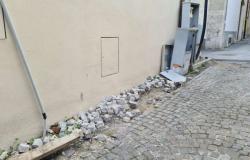
Lamezia Terme – The Institut Francais Italia, in collaboration with France Education International and Alliance Francaise Italia, awarded the Perri Pitagora school the Ecole Partenaire – Certifications de Francais plaque. The Institute, in fact, issues the DELF Prim and Scolaire certifications to students in the fifth classes of the Maggiore Perri primary school and in the second and third classes of the Pitagora secondary school. Particularly appreciated was the linguistic project which involved the students of the Institute starting from the school of childhood. Present at the meeting, coordinated by the representatives of the Pilot Center for certifications Caterina Conflitti and Virginie Salles, the representatives of the Institut Francais Italia Claire Thuadet and Cecilia Goloboff, Laura Pazienti, director of Office VI – Training of school personnel – of the Ministry of ‘Education, as well as various school directors, teachers from other Italian regions, representatives of the Embassy.
In his speech, the director Giuseppe De Vita, supported by the teacher of the “Pitagora” secondary school Cinzia Colistra, contact person for the Linguistic Department and by the teacher of the “Tommaso Campanella” high school in Lamezia Terme Carmen Marra, contact person for the Alliance Francaise of Catanzaro, presented the activity that fully fits into the vertical school curriculum, highlighting how children aged 3 to 5 years old, during curricular time, “follow lessons in a playful context, where role-playing games or themed conversations and proposals are organised, with a vocabulary limited and repetitive, simple sentences linked to the most common contexts of everyday life. All this in a cheerful, empathetic environment.” This is to fascinate them in the discovery of a new language, with unknown sounds and accents. Primary school students follow lessons during extracurricular hours and, at the end of the course, the most “ready” ones obtain the DELF Prim A1.1 certification. At the lower secondary level, the courses, always held in extracurricular hours, concern students of the second and third classes who obtain the DELF Scolaire level. A2. The creation of these paths joins the other foreign languages that are studied at Perri Pitagora, such as English, Spanish and German, and allows students to obtain a certification which becomes a linguistic passport for mobility in Europe and around the world and which enhance your CV.
The manager underlined “how the creation of these training courses was possible thanks to the precious collaboration with the Lamezzo linguistic high school “Campanella”, directed by the principal Susanna Mustari, who provides the necessary skills, including of a pedagogical nature, in the creation of the PCTO courses. , to their students who, in turn, become teachers of their “younger” classmates. A simple idea that proved to be effective: the strong point, in fact, becomes the closeness in age between the young students and their young “mentors”. They are led by the “Campanella” tutor Carmen Marra and welcomed, at the Maggiore Perri primary school, by the teacher. Lucia Zaffina while, at nursery school, from the ins. Susanna Mannella.The event continued with a visit to Palazzo Farnese, where in the presence of Ambassador Martin Briens, those present were able to admire the magnificence and the works present in the building, such as the Farnese gallery by Annibale Carracci, the the Hercules hall, which houses a selection of tapestries dating back to the 17th century, the Murano gallery and the Camerino. Many compliments were received from other school leaders regarding the replicability of the project in their schools.
“Our objective – continued manager De Vita – is not only to teach languages, in this case French, but to open the minds of our students, making them passionate about different cultures in a cosmopolitan perspective. In this framework, which is one of education, training and linguistic education for skills, the adults of tomorrow, the future ruling classes, are formed: people who are prepared, even linguistically, thus capable of interacting in the global society of the third millennium for the benefit and service above all of the territory of origin but also and more generally, of humanity, the ultimate reason for civil living as people in a community. Learning a new language is like opening a window on the world, said Nelson Mandela”.
© ALL RIGHTS RESERVED



